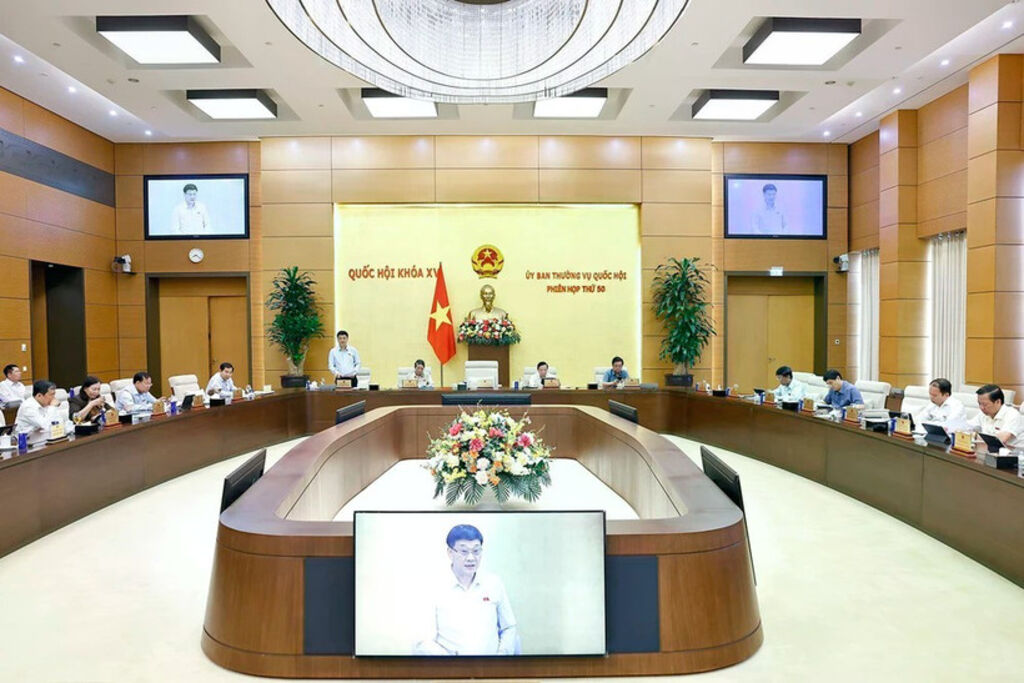 |
| An overview of the National Assembly Standing Committee's 50th session__Photo: VNA |
The National Assembly (NA) Standing Committee on October 17 adopted a resolution to adjust the personal income tax (PIT) deduction rates, applicable from the 2026 tax period, with final settlement in the first quarter of 2027.
In its proposal, the Government mentioned two options. In the first one, with a projected cumulative CPI increase of 21.24 percent from 2020 to 2025, the deduction for taxpayers will rise from VND 11 million (more than USD 417 ) per month to about VND 13.3 million, and from VND 4.4 million to VND 5.3 million per month per dependent. This would reduce state budget revenue by about VND 12 trillion per year.
In the second one, adjustment will base on per capita income and GDP growth.
These indicators increased by approximately 40–42 percent since 2020, according to the National Statistics Office. Under this plan, the deduction for taxpayers would increase to around VND 15.5 million per month, and to VND 6.2 million per month per dependent. A taxpayer earning VND 17 million per month would not owe PIT after standard deductions and insurance contributions. This option would reduce state revenue by about VND 21 trillion per year.
Deputy Minister of Finance Nguyen Duc Chi stated most opinions supported option 2, as it reflects real income growth and economic development.
The Government proposed that the resolution take effect upon signing and apply from the 2026 tax period.
The NA Standing Committee agreed with the Government’s proposal and officially adopted the resolution on PIT deductions. It also passed a resolution on environmental protection tax rates for fuels in 2026.
Also on October 17, as part of its 50th session, the NA Standing Committee reviewed the draft amended Investment Law.
Deputy Finance Minister Nguyen Thi Bich Ngoc presented the proposal, which includes seven chapters, 60 articles, and four appendices. The draft amends 33 articles, removes 17, retains 25, adds two new ones, and restructures content for clarity.
Key principles include shifting from pre-approval to post-approval management, enhancing oversight, and reducing administrative burden.
Particularly, the bill includes the removal of removing 21 conditional business sectors deemed unnecessary such as accounting services and tax procedures.
The law is proposed to take effect from January 1, 2026, to promptly address current investment hurdles.
Chairman of the NA Economic and Financial Committee Phan Van Mai emphasized support for the legal framework overhaul but called for deeper assessment of potential risks, especially the proposal to remove all NA authority over investment policy approval. He also urged careful review of amendments involving the Railway Law and asset transfers, and recommended retaining only essential conditional sectors.
Concerns were raised over foreign investors forming businesses before being licensed, which could raise issues with capital transfer or tax evasion. Oversight mechanisms must be clarified to align with Politburo Resolution 50-NQ/TW on selective and high-quality foreign investment.
During discussion, Standing Committee members stressed the law’s wide scope and significant impact on Vietnam’s investment environment and reform efforts.
In conclusion, NA Vice Chairman Vu Hong Thanh requested the Government to refine the draft based on three guiding principles - removing bottlenecks, ensuring a consistent and stable legal framework; enhancing decentralization, cutting unnecessary procedures and barriers, and ensuring constitutional and legal consistency, in harmony with related laws.
Also in the session, the NA Standing Committee approved budget allocation and investment plans for 2025 using surplus revenue from 2022-23 and merged public investment plans for post-merger localities.- (VNA/VLLF)









